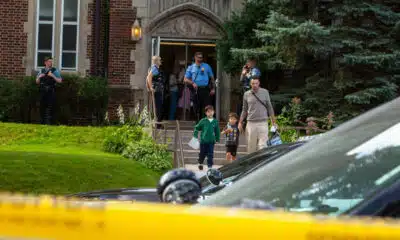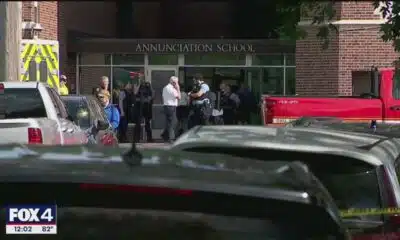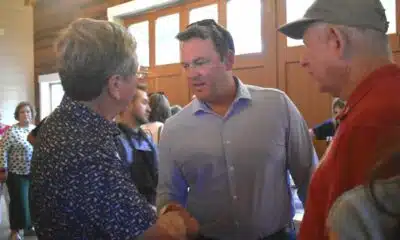News from the South - Texas News Feed
Val Verde County’s Conservative Democratic Sheriff on Misinformation, Immigration
The U.S.-Mexico border is perhaps the most widely discussed and poorly understood region in the country.
MAGA influencers and nationalistic politicians have inaccurately portrayed border communities as dangerous crime hotspots akin to a warzone and overwhelmed by asylum-seekers. In reality, border communities—at least on the U.S. side—are some of the country’s safest.

Joe Frank Martinez is the sheriff of Val Verde County, home to the border city of Del Rio. He’s a conservative Democrat: He’s pro-gun and anti-abortion, and he supports Governor Greg Abbott’s multi-billion-dollar Operation Lone Star militarization mission, which has flooded South Texas with police and soldiers and new stretches of border wall.
In summer 2021, Del Rio was thrown into the national spotlight when nearly 20,000 Haitian migrants came to the city’s border to seek refuge.
In recent years, previously Democratic strongholds among the state’s border communities have shifted to the right politically as Trump has made significant gains among Latino Texans, including in 81-percent-Hispanic Val Verde County. In the 2016 presidential election, only 43 percent of voters in Val Verde went for Trump. In 2024, that number increased to almost 63 percent.
A county top cop’s job is local policing, but even Martinez’s position has recently been politicized, and some of his community members expect him to take a tougher stance on immigration. In his most recent bid for sheriff, he was pressured to change parties, but he prevailed easily as a Democrat.
The Texas Observer spoke to Martinez about Operation Lone Star, South Texas voters’ rightward shift, and the realities of living on the border.
TO: Border crossings are at a historic low. Do you think Texas should cut back on Operation Lone Star funding?
I don’t, not at this time. I agree with the stance that the governor’s taking. We have a processing center [for Operation Lone Star] that was very instrumental in the arrests that DPS was making initially. In Val Verde County, there’s 443 charges pending on individuals that did not appear to court. I know that in Kinney County, there’s a little over 1,900. There’s 100-something in Dimmit [County]. All these individuals are gonna be arrested somewhere throughout the state—and they’re gonna be brought back to the county of arrest. So you can’t burden the local jails to house these individuals. My taxpayers shouldn’t be burdened with that financial loss.
OLS funds need to be looked at different. How can they still continue to support what’s going on? At the front door, you were there to make all the arrests. But at the back door, you still have to wait for the prosecution. A lot of these individuals are coming back to those counties where they were arrested. So don’t pull the rug out from under us just yet.
Immigration enforcement has historically been the role of the federal government, but the push for an expansion of 287(g) agreements expands those duties to local beat cops and sheriff’s deputies. Do you view immigration enforcement as a job that should also be tasked to local law enforcement?
I do not, not in our communities. We’re right at the front line, so we have plenty of Border Patrol agents to do their job. If we make a detention of an individual whose immigration status is questioned, we’re gonna call Border Patrol. I may have three to four deputies work in a single shift, patrolling 3,200 square miles. I’m not gonna deprive my citizens of calls for service because my deputies are tied up handling an immigration issue. It’d take anywhere from two to three minutes to get a Border Patrol agent on site. So we’ll just turn it over to Border Patrol.
What misconceptions do you think Americans have about life in border communities?
They don’t know what we experience—or don’t experience—on a day-to-day basis. Some of those people that are commenting or viewing from a million miles away don’t have a clue. I invite those people to come to the border and take a tour of the border at any time. Give me a call. Right now, they’re not gonna see anything, ’cause nothing’s happening. Governor Abbott has a border wall that is being constructed there in Val Verde County from Lake Amistad south along the river to Del Rio. And that’s gonna help protect my community.
My disagreement with that is that it put some of my residents on the wrong side of that wall. About 87-88 residents. Those people that have lived out there, overall, their entire lives. Some of those are absentee owners. I visited … with a handful of them. They don’t like looking at the structure. But for safety, they know what they need to do to protect their property. They can’t leave anything laying out in their yard because it might get hauled off. Somebody swims across the river and loads it on a boat, takes it back or whatever. So there’s mixed feelings on that. But for the most part, that wall … is really going to help [with] moving the flow of traffic away from my community.
In recent years, voters in many Texas border counties have moved to the right politically. Have you felt the impact of this shift in your community?
So at the local level, no. At the federal level, because of the previous administration, you could feel that shift, people going to the right. I might have lost some voters for my stance. I came out on top in that election, so that’s all that matters. I will continue to maintain my principles. I’m more conservative, more middle of the road. In our county government, we have five or six elected Republicans; everybody else is a Democrat.
You were pressured to change parties in this recent election, correct? What was that like and why did you choose to not change parties?
I want to stand on my morals and principles. I saw back in the ’60s and ’70s when my dad fought for the underprivileged in our communities. I helped as a young kid [to] dig post holes to put a mailbox on for the people that had no mail service, and that’s what that group was fighting for back in the day. This is a group of people that were Democrat back in the day. Friends of my dad. That’s what they fought for, to be equal. They had no mail service, some of our colonias. Just because I don’t agree with what they’re doing at the federal level, I’m not gonna abandon my beliefs just to go along with the flow. My beliefs and principles have remained steady and I’m not going to change.
Have your community’s expectations of your job changed as a result of increased border crossings in recent years?
There’s a group on the far right that wishes I’d done things a little bit different. There’s a photo out there of me helping a lady and a child out of the river. They were already on U.S. soil. What kind of human would I be if I couldn’t help a fellow human? What that picture doesn’t show is that that lady and that child were turned over to Border Patrol immediately within 30 seconds. Throughout my community, there’s guys that won’t talk to me because I helped the lady out of the river. Technically, she was in the U.S. already. It was no different than if I’m with somebody that’s coming across private land somewhere and is dehydrated or whatever, with me helping them by giving them water. No different.
When you recently introduced Governor Abbott to give a speech at the Texas Border Sheriff’s Coalition conference, you spoke about a 2021 event in Del Rio that you referred to as “the Haitian invasion”, as if the migrants were trying to cross for a foreign army. Why did you use the term “invasion”?
People have classified it as an invasion. That comes from the federal government, or comes from comments made by the public. There were masses of people. There [were] 19,000 people underneath that bridge, and they were just coming and going as they pleased. I guess that’s how I’ve referred to it. “Haitian invasion” just sounds right. People were coming and going, nothing was being done. It does ring like a military term, but I’m not a military person. My federal partners and my state partners and my deputies, they struggled over those 16 days trying to make sure that nobody died. There was … one baby born underneath that bridge. Things were out of control.
I was asking if you view that—to call it “invasion”—as dehumanizing language. I was wondering how you square that up with the fact that you also helped people out of the river.
I picked it up from comments being made at that time by either some of our federal or state representatives. I don’t know. … It’s a term that just stuck. To change it now to something else—you know, I’m not going to do that. The situation has kind of calmed down. So I have to think about that question, your questioning on the term of “invasion,” and evaluate it, see how I move forward.
Is there anything else that you wish people knew about your job as a border sheriff?
Before people start commenting on the border, come visit the border. Right now there’s nothing going on. I took a group … of about 12-14 people to the border. They thought it was a war zone. I took them on a border tour [during the Biden administration]. Their tone changed completely. They thought they had to wear helmets and vests and all that kind of stuff. It’s not a war zone. These [migrants] are people that try to come across to find a better way of life. At the same time, they see what I go through, so it kind of puts it into perspective. They’re not looking at it anymore from a million miles away. They’re right there. I invite you to go to the border.
This interview has been edited for length and clarity.
The post Val Verde County’s Conservative Democratic Sheriff on Misinformation, Immigration appeared first on www.texasobserver.org
Note: The following A.I. based commentary is not part of the original article, reproduced above, but is offered in the hopes that it will promote greater media literacy and critical thinking, by making any potential bias more visible to the reader –Staff Editor.
Political Bias Rating: Center-Right
The content leans center-right as it presents a perspective supportive of border enforcement policies such as Texas Governor Abbott’s Operation Lone Star, emphasizing the need for strong border security and local law enforcement’s role in immigration issues. However, it avoids extreme rhetoric and acknowledges the complexity of border life, including the humane treatment of migrants and the nuanced political views within border communities, including a conservative Democrat sheriff. This balance reflects a pragmatic center-right stance rather than an extreme or purely partisan viewpoint.
News from the South - Texas News Feed
Gunfire kills 2, injures 17 at Minneapolis school
SUMMARY: A gunman in his 20s opened fire outside the Annunciation Roman Catholic Church in Minneapolis during morning mass, targeting children attending the first week of school. Armed with a handgun, shotgun, and rifle, he fired multiple shots through the church windows, killing two children aged eight and ten and injuring 17 others, including 14 children, two critically. The shooter then took his own life. Minneapolis officials condemned the deliberate act of violence, expressing deep sorrow and urging community support for the grieving families. Police continue investigating the motive, noting the shooter had no criminal history or known connection to the church or school.
A gunman armed with three weapons opened fire on Catholic school students on Wednesday morning as they celebrated mass at Annunciation Church in Minneapolis, MN. Two children were killed and 17 others were injured. The gunman also died.
Subscribe to FOX 4: https://www.youtube.com/fox4news?sub_confirmation=1
Dallas news, weather, sports and traffic from KDFW FOX 4, serving Dallas-Fort Worth, North Texas and the state of Texas.
Download the FOX LOCAL app: fox4news.com/foxlocal
Watch FOX 4 Live: https://www.fox4news.com/live
Download the FOX 4 News App: https://www.fox4news.com/apps
Download the FOX 4 WAPP: https://www.fox4news.com/apps
Follow FOX 4 on Facebook: https://www.facebook.com/Fox4DFW/
Follow FOX 4 on Twitter: https://twitter.com/FOX4
Follow FOX 4 on Instagram: https://www.instagram.com/fox4news/
Subscribe to the FOX 4 newsletter: https://www.fox4news.com/newsletters
News from the South - Texas News Feed
Austin’s Mama Duke advances to AGT finals after getting Golden Buzzer
SUMMARY: Austin-based singer and rapper Mama Duke impressed judges and audiences on America’s Got Talent Season 20. During the live Quarterfinals, judge Mel B slammed the Golden Buzzer for Mama Duke’s original song “The Mama Duke Show,” sending her directly to the finale and bypassing semifinals. Mel B praised her talent, comparing her potential to Missy Elliott. Other judges, including Simon Cowell and Sofía Vergara, also lauded her authenticity and unique style. Mama Duke gained popularity after her audition song “Feels So Good To Be You” charted on iTunes. The finale will air on September 23, with viewers voting to decide the winner.
Read the full article
The post Austin's Mama Duke advances to AGT finals after getting Golden Buzzer appeared first on www.kxan.com
News from the South - Texas News Feed
West Texas Congressman’s ‘Big Beautiful’ Cuts Could Harm Rural Hospitals in His District
Since it was signed into law on July 4, West Texas Republican Congressman Jodey Arrington has been broadly praised by allies for his stewardship of the so-called One Big Beautiful Bill Act (OBBBA). U.S. House Speaker Mike Johnson called Arrington, who chairs the powerful House Budget Committee, “one of the most effective and consequential members of Congress.” And Arrington has wasted no time touting his victory in West Texas, proclaiming it to be a “game changer for Rural America” and “a big beautiful win for West Texas.” He’s argued the so-called entitlement cuts to Medicaid, the Affordable Care Act (ACA), and the Supplemental Nutrition Assistance Program will “root out waste and fraud.”
But many of his constituents in Congressional District 19—a vast, deeply red rural district that includes over 30 counties—stand to lose access to both their healthcare and their local hospitals under the massive tax-and-spending bill, which will slash Medicaid and ACA spending by more than $1 trillion and knock 10 million more people off of insurance nationwide over the next 10 years, according to Congressional Budget Office estimates. Arrington’s district is home to more rural hospitals than any other in Texas, and roughly a quarter of those are at risk of closing under the new law, according to a recent study. Six of the 25 hospitals in the 19th are at risk of closing, according to a June study by the Cecil G. Sheps Center for Health Services Research at the University of North Carolina. Using data from 2020 to 2022, the study defined at-risk rural hospitals as those with three consecutive years operating with a negative profit margin or those which receive a disproportionately large share of revenue from Medicaid.
Losses to rural hospitals from changes to Medicaid funding under the new law may be blunted by a $50 billion rural health fund that was added as a last-minute concession to rural members. The National Rural Health Association projected that the major hit Texas rural hospitals would take under the new law would shrink from an estimated loss of $1.2 billion to $407 million after the rural fund is applied over the next five years. But both the federal Centers for Medicare & Medicaid Services and state governments will have wide latitude on how to use the funding.
That’s left rural hospital administrators in Arrington’s district uncertain about the future of their facilities—and how the new law will affect them. Dennis Fleenor, the leader of the hospital in Muleshoe in Arrington’s district, has concerns. “By the time CMS and the state and everybody else get their fingers in that small slice of pie,” Fleenor said, rural hospitals like the one he runs may not get much money from the rural health fund.
Arrington did not respond to the Observer’s questions about the healthcare impact residents and hospitals in his district may face under the OBBBA. Arrington has served as the district’s representative since 2017 after a career that included working for a private healthcare company, for Texas Tech University, and as an aide for George W. Bush in the Texas Governor’s Office and the White House. Arrington has served as chairman of the House Budget Committee, one of the most influential positions in Congress, since 2023. He’s also served on the House’s Rural and Underserved Communities Health Task Force since 2019.
The 19th Congressional District hugs the New Mexico border on the west and crosses central West Texas past Abilene to the east. Anchored by Lubbock and Abilene, the district is largely rural, featuring 17 million acres of farmland that produce a fifth of the state’s total agricultural sales and more cotton than any other district in the country. It’s also mostly white and deeply conservative. Around 15 percent of the district’s residents are uninsured, according to 2023 census figures, which is nearly on par with the statewide rate—the highest in the nation. Many residents in Arrington’s district rely on public healthcare: 131,000 or 18 percent of the district population are enrolled in Medicaid. Statewide, 16 percent of residents are enrolled.
Ten percent of the district’s population is enrolled through the ACA marketplace, lower than the state’s 15-percent rate, according to a study by the health research and policy organization KFF. The tax-and-spending bill doesn’t extend ACA tax credits that expire at the end of the year and thus will cause insurance premiums to surge for the vast majority of current enrollees. KFF estimates the removal of the tax credits and added hurdles to enroll in the ACA could cause 1.7 million Texans to lose ACA coverage.
Because Texas never expanded Medicaid under the ACA, the state will not have to impose work requirements on Texas’ Medicaid patients or reduce its provider tax rate, which will be a requirement under the new law starting in 2027. However, the OBBBA did freeze the provider tax rates states use to finance Medicaid on July 4, making it more difficult for states to increase their own funding for the program.
Dr. Adrian Billings, a longtime West Texas community physician and associate dean of the Rural and Community Engagement Division at Lubbock’s Texas Tech Health Sciences Center, said that hospitals are required by law to provide emergency care to patients regardless of whether they can pay. But unlike urban hospitals that serve a higher volume of patients and can better afford to offset the costs of treating uninsured patients, increases in uninsured rates can quickly dig rural hospitals into bigger financial holes.
“It is harder for a rural hospital to absorb when somebody without insurance shows up in the emergency room or needs to be hospitalized,” Billings said. “There’s just not much fluff at all left in a rural hospital’s margins to suffer any significant hit to their collection.”
The Mitchell County Hospital District serves the county of nearly 9,000 in the southern area of Arrington’s district, situated between Big Spring and Sweetwater. CEO Michelle Gafford told the Observer that the county hospital projected to lose about $700,000 in Medicaid funding, or roughly 3 percent of its 2026 fiscal year budget. “The cuts are going to hurt everybody, but they are not as crucial as they once would have been,” Gafford said, since the hospital’s share of Medicaid patients has steadily transferred to privately run managed care organizations. In the 13 years Gafford has worked at the hospital, it’s made a profit in only one year. The hospital is designated as a critical-access hospital, which allows it to receive Medicare reimbursements at roughly the same amount of the cost of services. However, other insurers, particularly Medicare Advantage and other private insurers, routinely underpay or deny coverage for services, leaving rural hospitals like the Mitchell County Hospital District persistently in a financial hole.

More recent data gathered and analyzed by the Center for Healthcare Quality and Payment Reform shows that 11 rural hospitals in Arrington’s district now have had a negative total margin in the most recent three consecutive years with available data—representing over half of the 19 total such hospitals in the state. According to that data, three hospitals in the district have 20 percent or more of the hospital’s patient costs associated with Medicaid services. That includes the Muleshoe Area Medical Center.
Since the 1980s, the Muleshoe-area hospital, located in the sparse western Panhandle near the New Mexico border, has gone through its ups and downs as its owners changed from one group to another. According to the hospital’s website, after one national company bankrupted the hospital in 1987, a Muleshoe physician named Bruce Purdy kept it running by seeing patients, cleaning its bathrooms, repairing the facilities, and even sleeping in his clinic to attend to late-night emergencies. Dennis Fleenor, a Lubbock transplant, now runs the critical-access hospital on a shoestring budget. “It’s a struggle everyday. But we’re here to take care of our community, and we will take care of our community whatever challenges we face,” he told the Observer. But he said that Congress can go a long way to help rural hospitals by making insurers fully reimburse hospitals for patient service costs. Even though the hospital reported an average of 20 percent of the hospital’s patient service costs over the last two years were related to services for Medicaid patients, Medicaid paid the hospital for only 18 percent of those costs.
Between 2005 and 2025, 25 rural hospitals in Texas have closed, the most of any state, according to the center’s analysis. In CD-19, two rural hospitals closed during that time and at least six of the district’s 30 counties in the district already lack hospitals. In Jones County, north of Abilene, there once were three hospitals. In 2018, Stamford Memorial Hospital closed because it didn’t have enough in-patients. The following year, nearby Hamlin Memorial Hospital closed, leaving only its medical clinic and emergency medical services open. By 2023, Anson General Hospital was hanging by a thread with $1.9 million in outstanding debt. At that point, its board decided to convert the facility to a “rural emergency hospital.” That federal designation was established under a 2021 law that Arrington helped spearhead as a last resort for rural hospitals; in order to qualify for federal grants, those facilities must eliminate in-patient services. Texas now has five Rural Emergency Hospitals statewide; two, Anson General Hospital and Crosbyton Clinic Hospital, are in Arrington’s district.
Vance Boyd, an Anson-based cattleman, pro bull rider, and general contractor, told the Observer he remembers when Anson General Hospital was “thriving, productive, and employed a lot of people.” But he said it’s now “a triage center to get you to a bigger market.” As a cancer survivor, he travels roughly 24 miles to Abilene to see his doctor. “If you’re having a health emergency in a more remote area, you’re pretty much on a dice roll whether you’re going to make it,” Boyd said.
Gaines County, which borders New Mexico, was the epicenter of Texas’ recent measles outbreak. Since January, the outbreak led to 762 cases, 99 hospitalizations, and two deaths statewide, according to the Texas Health and Human Services. Eighty-one percent of the cases occurred in counties within Arrington’s district. Cash-strapped county hospitals with crumbling infrastructure in the surrounding area lacked the space to test for measles or beds to treat patients, the Texas Tribune reported.
Frustrated with the healthcare system, the “death spiral” of rural hospitals, and “AWOL” politicians, Boyd, a conservative Republican, ran against Arrington unsuccessfully in the 2020 and 2024 GOP primaries. His campaign centered, in part, around the need to expand Medicaid in Texas.
“When you live in an area where the average income is low and many are on some sort of government assistance, to expect everybody to have a premium healthcare plan is not realistic,” Boyd said. “I feel like our representative didn’t fight for us.”
Arrington, meanwhile, has his sights set on even further cuts to Medicaid. In mid-July, less than two weeks after he helped pass the OBBBA, Arrington told Bloomberg News that he would be seeking to pass deeper cuts to Medicaid, along with Medicare cuts that he had tried and failed to get locked into the Big Beautiful Bill. Among Arrington’s goals for a budget bill sequel this fall are to cut the federal reimbursement rate to penalize states that expanded Medicaid coverage under the ACA and reduce Medicare reimbursements to hospitals by paying the same rate regardless of the provider.
“I think we will do one before the end of the year,” Arrington told Bloomberg News. “It’s going to be a more targeted set of reforms.”
The post West Texas Congressman’s ‘Big Beautiful’ Cuts Could Harm Rural Hospitals in His District appeared first on www.texasobserver.org
Note: The following A.I. based commentary is not part of the original article, reproduced above, but is offered in the hopes that it will promote greater media literacy and critical thinking, by making any potential bias more visible to the reader –Staff Editor.
Political Bias Rating: Center-Left
This content presents a critical perspective on a Republican congressman’s budget bill, emphasizing the negative impacts of Medicaid and ACA cuts on rural hospitals and vulnerable populations. While it acknowledges the congressman’s achievements and conservative district context, the overall tone highlights concerns about healthcare access and funding reductions, reflecting a viewpoint more aligned with center-left critiques of conservative fiscal policies.
-
News from the South - Arkansas News Feed6 days ago
New I-55 bridge between Arkansas, Tennessee named after region’s three ‘Kings’
-
News from the South - Texas News Feed4 days ago
DEA agents uncover 'torture chamber,' buried drugs and bones at Kentucky home
-
News from the South - Missouri News Feed6 days ago
Missouri settles lawsuit over prison isolation policies for people with HIV
-
News from the South - Louisiana News Feed7 days ago
Families with citizen children deported by ICE sue Trump administration
-
Our Mississippi Home6 days ago
Vardaman: The Sweet Potato Capital Serving Up Love, Tradition, and Flavor at Sweet Potato Sweets
-
News from the South - Georgia News Feed7 days ago
Bookman: Here’s how Georgia’s 2020 election crisis will factor into 2026 GOP campaigns for governor
-
News from the South - Virginia News Feed6 days ago
Erin: Tropical storm force winds 600 miles wide eases into Atlantic | North Carolina
-
Local News6 days ago
Florida must stop expanding ‘Alligator Alcatraz’ immigration center, judge says











































